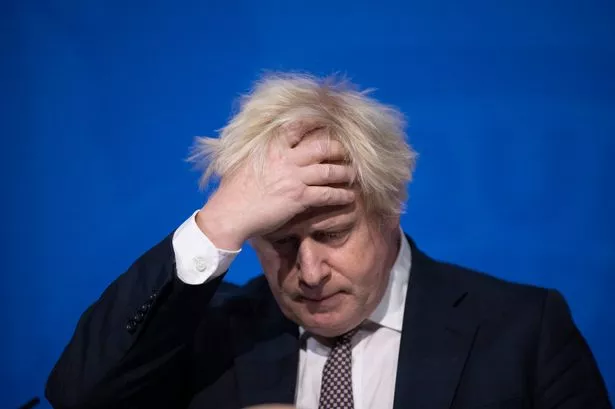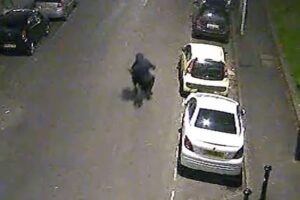
Former prime minister Boris Johnson presided over a “toxic” culture in Number 10 and regularly changed his mind
Prime Minister Boris Johnson presided over ‘toxic culture’ in No10 during the Covid pandemic, a report has found(Image: PA)
Chaos at the heart of government and a failure to take Covid-19 seriously cost 23,000 lives in the first wave of the pandemic, a public inquiry has concluded. Former prime minister Boris Johnson presided over a “toxic” culture in Number 10 and regularly changed his mind, while cabinet members including health secretary Matt Hancock plus key scientists all failed to act with the urgency needed to tackle the virus.
Baroness Heather Hallett’s report on the government response to Covid accused Mr Johnson of being too “optimistic” in his outlook in the early months of 2020. And she said his special adviser, Dominic Cummings, used “offensive, sexualised and misogynistic” language as he “poisoned” the atmosphere in Downing Street.
The inquiry found that the first and second lockdowns of the pandemic were not inevitable, but the government was left with no choice after failing to implement measures such as social distancing and household quarantine earlier. Not imposing any lockdown at all when it became apparent there was no choice would have “led to an unacceptable loss of life” but bringing in one a week earlier, on March 16, would have cut deaths in the first wave to July “by 48% – equating to approximately 23,000 fewer deaths” in England.
The inquiry found:
The spread of the virus around the world represented “clear warning signs” but the four governments across the UK did not take the virus seriously enough until it was “too late”.By the end of January 2020 it “should have been clear that the virus posed a serious and immediate threat”.February 2020 was “a lost month” and the lack of urgency overall in government was “inexcusable”.As the pandemic unfolded, Mr Hancock “gained a reputation among senior officials and advisers at 10 Downing Street for overpromising and underdelivering”.Adviser Mr Cummings observed that, in February, his view was that the Cabinet Office and Department of Health and Social Care “weren’t banging alarm bells at this point. Far from it, they were going skiing”.There was a “toxic and chaotic culture” at the centre of the UK government throughout the pandemic, with the inquiry hearing evidence of the “destabilising behaviour of a number of individuals – including Dominic Cummings”. Lady Hallett said: “By failing to tackle this chaotic culture – and, at times, actively encouraging it – Mr Johnson reinforced a culture in which the loudest voices prevailed and the views of other colleagues, particularly women, often went ignored, to the detriment of good decision-making.” Mr Johnson should have “addressed” Mr Cummings’ behaviour, the report added.Had more stringent restrictions, short of a “stay at home” lockdown, been introduced earlier than March 16, “the mandatory lockdown that was imposed might have been shorter or conceivably might not have been necessary at all”.Early in March, the advice to the public was “weak” and focused on hand hygiene and little else. “Face masks were positively discouraged for the public, mass gatherings continued to take place, thereby reinforcing the message that close social contact was approved, and Mr Johnson’s optimistic nature frequently undermined the serious message he was meant to convey.”Similar mistakes were then repeated later in 2020 as the second lockdown approached, all of which were “inexcusable”.While the lockdowns of 2020 and 2021 undoubtedly saved lives, they also “left lasting scars on society and the economy, brought ordinary childhood to a halt, delayed the diagnosis and treatment of other health issues and exacerbated societal inequalities”.Alcohol-filled parties in Downing Street “undermined public confidence in decision-making” and significantly increased the risk of the public abandoning lockdown rules. They were also a blow to people who had “endured huge personal costs” to stick to the rules – including those “unable to be with their loved ones when they died”.The vast majority of children were not at risk of serious direct harm from Covid-19, “but suffered greatly from the closure of schools and requirement to stay at home”. Children “were not always prioritised” and the Government was not prepared for the “sudden and enormous task” of educating children in their homes “and failed sufficiently”.The Eat Out to Help Out scheme was “inconsistent” with public health objectives and was devised “in the absence of any scientific advice”.There was also a “lack of trust” between Mr Johnson and the first ministers of the devolved nations.Frequent law changes “fuelled confusion, misunderstanding and – at times – incorrect enforcement”. It said: “The public – and even the police – struggled to distinguish between government advice and binding legal restrictions.”
In the report, Lady Hallett said the Covid threat was initially treated as a “health issue”, adding it was “surprising” that a Government Cobra meeting was not chaired by Mr Johnson until March 2.
The report added that Mr Johnson “should have appreciated sooner that this was an emergency that required prime ministerial leadership to inject urgency into the response”.
Instead, he failed to appreciate the urgency of the situation “due to his optimism it would amount to nothing”, his “scepticism arising from UK experiences of infectious disease” along with “misleading reassurances” from the Department of Health, headed by Mr Hancock.
Elsewhere, the report criticised the theory of “behavioural fatigue” – the concept that the public would not adhere to restrictions over a long period of time – which was promoted by England’s chief medical officer, Professor Sir Chris Whitty.
Lady Hallett said the behavioural fatigue theory has “no grounding in behavioural science”.
On the ability to test for Covid-19, the report was highly critical of the UK’s lack of testing capacity which meant officials had “no real understanding of the spread of the virus”, with “dire” consequences.
After imposing the first lockdown, the government also did not have a strategy for exiting it, even though this “should have been at the forefront of decision-makers’ minds”.
Later on, there was also “insufficient attention” given to the prospect of a second wave of the virus.
The weakness of the restrictions in the middle of 2020 and Mr Johnson’s “oscillation” enabled the virus to continue spreading at pace, and ultimately resulted in a second lockdown.
In a statement, Lady Hallett said all four governments across the UK failed to “appreciate the scale of the threat or the urgency of response” Covid-19 demanded.





